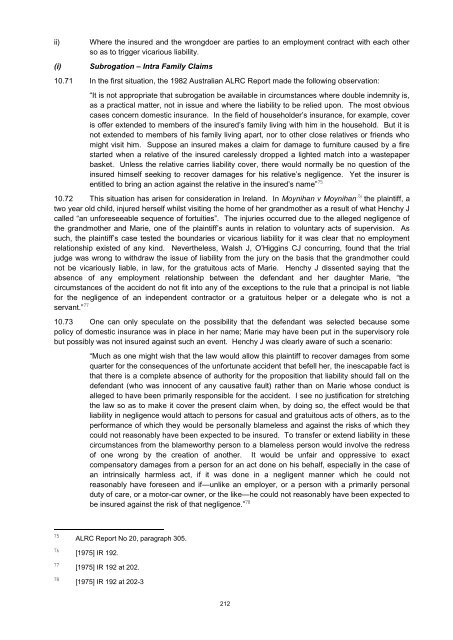Insurance Contracts CP - Law Reform Commission
Insurance Contracts CP - Law Reform Commission
Insurance Contracts CP - Law Reform Commission
You also want an ePaper? Increase the reach of your titles
YUMPU automatically turns print PDFs into web optimized ePapers that Google loves.
ii)<br />
(i)<br />
Where the insured and the wrongdoer are parties to an employment contract with each other<br />
so as to trigger vicarious liability.<br />
Subrogation – Intra Family Claims<br />
10.71 In the first situation, the 1982 Australian ALRC Report made the following observation:<br />
―It is not appropriate that subrogation be available in circumstances where double indemnity is,<br />
as a practical matter, not in issue and where the liability to be relied upon. The most obvious<br />
cases concern domestic insurance. In the field of householder‘s insurance, for example, cover<br />
is offer extended to members of the insured‘s family living with him in the household. But it is<br />
not extended to members of his family living apart, nor to other close relatives or friends who<br />
might visit him. Suppose an insured makes a claim for damage to furniture caused by a fire<br />
started when a relative of the insured carelessly dropped a lighted match into a wastepaper<br />
basket. Unless the relative carries liability cover, there would normally be no question of the<br />
insured himself seeking to recover damages for his relative‘s negligence. Yet the insurer is<br />
entitled to bring an action against the relative in the insured‘s name‖ 75<br />
10.72 This situation has arisen for consideration in Ireland. In Moynihan v Moynihan 76 the plaintiff, a<br />
two year old child, injured herself whilst visiting the home of her grandmother as a result of what Henchy J<br />
called ―an unforeseeable sequence of fortuities‖. The injuries occurred due to the alleged negligence of<br />
the grandmother and Marie, one of the plaintiff‘s aunts in relation to voluntary acts of supervision. As<br />
such, the plaintiff‘s case tested the boundaries or vicarious liability for it was clear that no employment<br />
relationship existed of any kind. Nevertheless, Walsh J, O‘Higgins CJ concurring, found that the trial<br />
judge was wrong to withdraw the issue of liability from the jury on the basis that the grandmother could<br />
not be vicariously liable, in law, for the gratuitous acts of Marie. Henchy J dissented saying that the<br />
absence of any employment relationship between the defendant and her daughter Marie, ―the<br />
circumstances of the accident do not fit into any of the exceptions to the rule that a principal is not liable<br />
for the negligence of an independent contractor or a gratuitous helper or a delegate who is not a<br />
servant.‖ 77<br />
10.73 One can only speculate on the possibility that the defendant was selected because some<br />
policy of domestic insurance was in place in her name; Marie may have been put in the supervisory role<br />
but possibly was not insured against such an event. Henchy J was clearly aware of such a scenario:<br />
―Much as one might wish that the law would allow this plaintiff to recover damages from some<br />
quarter for the consequences of the unfortunate accident that befell her, the inescapable fact is<br />
that there is a complete absence of authority for the proposition that liability should fall on the<br />
defendant (who was innocent of any causative fault) rather than on Marie whose conduct is<br />
alleged to have been primarily responsible for the accident. I see no justification for stretching<br />
the law so as to make it cover the present claim when, by doing so, the effect would be that<br />
liability in negligence would attach to persons for casual and gratuitous acts of others, as to the<br />
performance of which they would be personally blameless and against the risks of which they<br />
could not reasonably have been expected to be insured. To transfer or extend liability in these<br />
circumstances from the blameworthy person to a blameless person would involve the redress<br />
of one wrong by the creation of another. It would be unfair and oppressive to exact<br />
compensatory damages from a person for an act done on his behalf, especially in the case of<br />
an intrinsically harmless act, if it was done in a negligent manner which he could not<br />
reasonably have foreseen and if—unlike an employer, or a person with a primarily personal<br />
duty of care, or a motor-car owner, or the like—he could not reasonably have been expected to<br />
be insured against the risk of that negligence.‖ 78<br />
75<br />
76<br />
77<br />
78<br />
ALRC Report No 20, paragraph 305.<br />
[1975] IR 192.<br />
[1975] IR 192 at 202.<br />
[1975] IR 192 at 202-3<br />
212

















